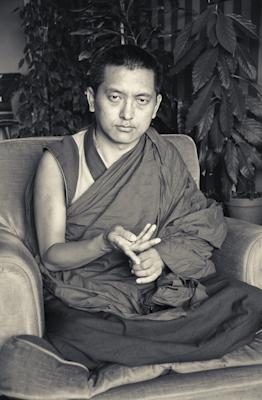Dear Friends,
Welcome to the July issue of our monthly e-letter. We hope you enjoy reading updates of the latest work that we've undertaken together, for the benefit of all beings everywhere. Please share!
On Sunday, August 4, we will celebrate one of the year's four main Buddhist holy days, Chokhor Duchen, the Festival of Turning the Wheel of Dharma. On this day Guru Shakyamuni Buddha gave his first teaching, seven weeks after attaining enlightenment, when five disciples asked him to teach. In response, he expounded the four noble truths. In the FPMT, we also celebrate this as International Sangha Day.
Chokhor Duchen is a Merit Multiplying Day when, as Lama Zopa Rinpoche has said, karmic results are multiplied one hundred million times, citing the Vinaya text, Treasury of Quotations and Logic. Therefore, August 4 will be a very effective day on which to make an offering to LYWA. Don't worry, we will remind you!
From the Video Archive: On Universal Education
Lama Zopa Rinpoche describes the goals of Universal Education in this intimate talk given at Vajrapani Institute, Boulder Creek, California, in 2002. Rinpoche describes which practices and studies can help young people (and all people for that matter) to live their lives full of joy and peace. Rinpoche especially advises us to study the inspiring life stories of individuals like the Buddha and St. Francis of Assisi, who are examples of great compassion and an incredible source of inspiration.
Visit and subscribe to the LYWA YouTube channel to view dozens more videos freely available from our archive.
Special Video Offering: Oral transmission of the Vajra Cutter Sutra
Kirti Tsenshab Rinpoche offers an oral transmission of the Vajra Cutter Sutra in Tibetan at Vajrapani Institute in 2002. Lama Zopa Rinpoche has said of Kirti Tsenshab Rinpoche, “He is a great Kadampa master who shows the real Kadampa tradition…so completely renounced. There’s not one slightest worldly activity, not the slightest eight worldly dharmas, no self-cherishing thought. Even talking, everything is as much as possible pleasing to sentient being’s minds.”
Kirti Tsenshab Rinpoche entered tukdam, the final meditation, on December 16, 2006. You can find the Vajra Cutter Sutra in English here on the FPMT website.
This month on the LYWA Podcast: Prajnaparamita, the Wisdom Gone Beyond
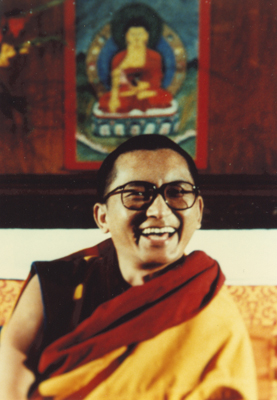 It is huge, it is most profound meditation, of the most important meditation, just thinking meaning of existing, or just thinking meaning of dependent arising, just that word, think meaning, meditate on meaning of dependent, then meditate on meaning of arising without many words, that’s just, say, the two truths are there.
It is huge, it is most profound meditation, of the most important meditation, just thinking meaning of existing, or just thinking meaning of dependent arising, just that word, think meaning, meditate on meaning of dependent, then meditate on meaning of arising without many words, that’s just, say, the two truths are there.
-Lama Zopa Rinpoche
In this month’s podcast, Lama Zopa Rinpoche praises the ultimate wisdom, the Prajnaparamita, the Wisdom Gone Beyond. This wisdom goes beyond the path, the result and the very nature of reality itself. Rinpoche shows us how to apply these profound teachings to our appearances and experiences. They were given during a lamrim retreat at Vajrapani Institute in Boulder Creek, CA, from August 20-23, 2006. You can read along with the transcript here on our website.
The LYWA podcast contains hundreds of hours of audio, each with links to the accompanying lightly edited transcripts. See the LYWA podcast page to search or browse the entire collection by topic or date, and for easy instructions on how to subscribe.
WHAT'S NEW ON OUR WEBSITE
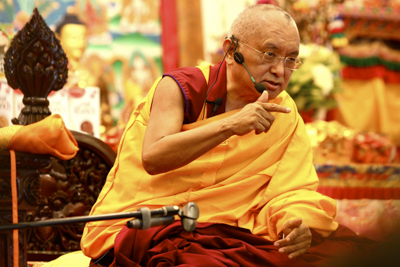 We have just posted the sixth discourse from Lama Zopa Rinpoche’s Teachings at the Kadampa Deities Retreat in France, 2003. In this teaching, Rinpoche explains how to meditate on emptiness based on verses from the Vajra Cutter Sutra and the Seven-Point Mind Training text. The teaching includes colorful anecdotes from Rinpoche’s own experiences. You can read an excerpt of it below in this month's eletter teaching.
We have just posted the sixth discourse from Lama Zopa Rinpoche’s Teachings at the Kadampa Deities Retreat in France, 2003. In this teaching, Rinpoche explains how to meditate on emptiness based on verses from the Vajra Cutter Sutra and the Seven-Point Mind Training text. The teaching includes colorful anecdotes from Rinpoche’s own experiences. You can read an excerpt of it below in this month's eletter teaching.
As usual we like to share with you new additions to Lama Zopa Rinpoche's Online Advice Book:
- Meditate on the Kindness of Others: Rinpoche sent this advice about thought transformation to a student who was very sick in hospital.
- Impatient and Upset at the Teachings: A student confessed becoming impatient and upset while attending one of Rinpoche’s teachings. Rinpoche advised how to purify any negative karma collected.
- Freedom is in Our Hands: Rinpoche explained the importance of Dharma practice in this advice given to a student who had asked about a lack of success.
- Transference of Consciousness at Death Time: Advice about powa, the transference of consciousness at the moment of death, given to a long-time student who was close to passing away.
On our website, you can always find a list of all the newly-posted advices from Lama Zopa Rinpoche.
lama yeshe's Enlightened experience
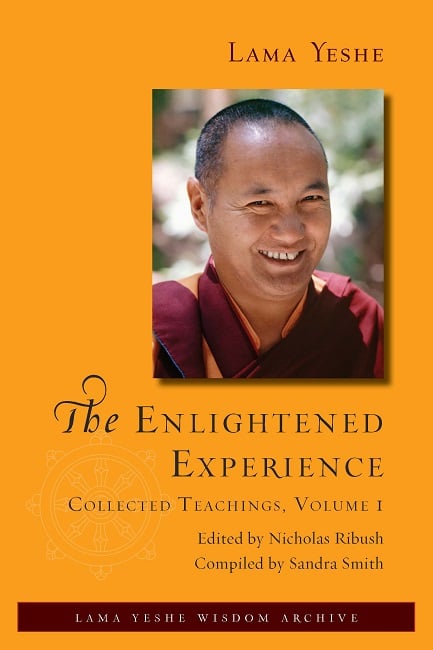 While indexing continues on Big Love, as mentioned in last month's eletter, we'd like to remind you that the first volume of a new ebook series by Lama Yeshe, The Enlightened Experience: Collected Teachings, has now been published. In this book, Lama Yeshe gives an overview of the principal aspects of the path to enlightenment and offers general advice on relationships, educating children and a range of other topics. Visit our online store to order The Enlightened Experience from your favorite vendor. LYWA Members can download the ebook for free from the Members Area.
While indexing continues on Big Love, as mentioned in last month's eletter, we'd like to remind you that the first volume of a new ebook series by Lama Yeshe, The Enlightened Experience: Collected Teachings, has now been published. In this book, Lama Yeshe gives an overview of the principal aspects of the path to enlightenment and offers general advice on relationships, educating children and a range of other topics. Visit our online store to order The Enlightened Experience from your favorite vendor. LYWA Members can download the ebook for free from the Members Area.
Thank you so much for your generous support, which makes all of this possible.
Much love,

Nick Ribush
Director
THIS MONTH'S TEACHING: Meditation on Emptiness
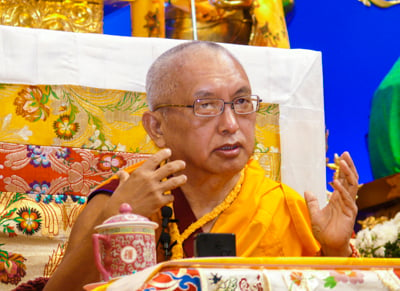 Do not commit any unwholesome actions.
Do not commit any unwholesome actions.
Engage in perfect, wholesome actions.
Subdue your mind thoroughly.
This is the teaching of the Buddha.
As Kirti Tsenshab Rinpoche says, this stanza shows the four noble truths. “Do not commit any unwholesome actions” shows true suffering and the true cause of suffering. “Engage in perfect wholesome virtue” shows the true path and “Subdue your mind” shows the cessation of suffering. The stanza concludes with "This is the teaching of the Buddha."
However, I think that the actual teaching of the Buddha is a universal teaching. It’s just a matter of understanding [the four noble truths.] If we don’t understand that, the Buddha’s teaching looks like something peculiar or particular, but if we understand it, we can see that the Buddhadharma is a universal teaching; the four noble truths is a universal teaching. If we don’t understand delusion and karma, then maybe the Buddha’s teaching doesn’t become universal, however it becomes universal when we come to know and become familiar with karma—that happiness comes from our own positive actions, our virtuous actions and virtuous thoughts, and all our life problems and suffering come from our nonvirtuous actions, our negative actions and negative thoughts.
Through our own experiences we come to know the effects of our positive actions and positive thoughts and the effects of our negative actions and negative thoughts. We know that suffering comes from our unrighteous or mistaken actions and mistaken thoughts, and happiness comes from our correct actions, our positive actions and positive thoughts, the healthy mind. Through our own experiences we know that the negative effects, the immediate effects, come from the unhealthy mind, the mistaken thoughts. This is universal.
Just as doctors explain where an illness comes from—the common circumstances or causes—similarly, the teaching of the Buddha becomes universal. We come to know this as we understand delusion and karma more deeply, as we learn more about our own mind, about delusion and karma, the cause of the sufferings—the cause of death, what creates or what produces death, old age, sickness and rebirth, what produces or creates rebirth, reincarnation.
Delusion and karma come from the mind; they don’t come from outside. The main cause is the mind, so we need to learn more about our own mind, about delusion and karma, and about the path, that which is, of course, explained in the texts.
The actual path which ceases our own delusion and karma and suffering is our own mind, our own positive mind transformed into total detachment from samsara, from the samsaric perfections, by having developed the wisdom realizing the ultimate nature of the I, the aggregates—the root—and then phenomena. When we develop the wisdom directly perceiving emptiness we directly cease the defilements.
First of all, there are intellectual defilements, the delusions, but by actualizing the right-seeing path and the path of meditation we can cease the simultaneously-born delusions. Those defilements, including the seeds of delusion, are ceased. When there are no mistakes, when there are no disturbing-thought obscurations, including the seeds of delusion, we achieve the true cessation of suffering on this mental continuum. The ultimate nature of the mind is the true cessation of suffering and this is achieved after having ceased all these disturbing-thought obscurations, including the seeds of delusion.
It’s all scientific and is according to those who have correctly practiced, as the Buddha’s teaching says, and who actually experience this. By actualizing those paths they are able to remove the defilements step-by-step. Those practitioners are the real scientists of the mind, removing the cause of suffering and achieving everlasting happiness.
Therefore it is a universal thing when we come to know the subject; it’s nothing kind of strange, it’s a universal thing when we come to know that. However, even though it is a universal thing, it is not mentioned clearly or completely like this in every religion.
Only the Buddha’s teaching mentions the fundamental path, the four noble truths. This is the teaching of the Buddha, what the Buddha taught. This is the way the Buddha liberates sentient beings; this is the basic method shown by the Buddha to liberate us sentient beings.
Teachings at the Kadampa Deities Retreat were given by Lama Zopa Rinpoche at a retreat held at Institut Vajra Yogini, France, from 18 April to 11 May 2003. Edited by Sandra Smith. You can read the complete teaching here.
























